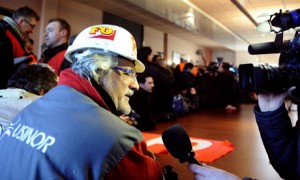One conspicuous absentee from the Occupy movement has been France, despite its long radical heritage. At a meeting in November 2011 in New York, French intellectuals expressed disdain for the ideas of consensus and the indignés as being insufficiently rigorous. Now French steelworkers have occupied their plant and put up tents.
A coalition of French unions has set in motion an occupation at the ArcelorMittal plant in the north-eastern town of Florange in the Moselle, following a decision taken at a general assembly of workers. The plant employs about 5000 people and several hundred workers have set up in the offices to prevent management from permanently shutting down the plant. They hope for a government intervention as the last hope of saving their jobs.
ArcelorMittal is the self-declared leading global integrated mining and steel production company with revenues of over $94 billion in 2011 and outlets in 60 countries. However, the firm has recently shut down plants in Belgium and Madrid, leading the workforce to distrust assurances that this will be just a temporary shutdown. Perhaps the fact that CEO Lakshmi Mittal is on the board of Goldman Sachs fails to inspire confidence in the workforce?
Their strategy is to maintain political pressure on the government with actions on at least a weekly basis until the end of the French presidential elections in May. In the last election, Sarkozy promised to keep a neighboring steel plant at Garange in production but has failed. In fact, over 350,000 industrial jobs have been lost in France in the last four years. However, the leader of the Left Front, Jean-Luc Mélenchon, reasserted today that “democracy is not a matter of consensus,” in the context of his entirely appropriate opposition to the fascist National Front. Mélenchon might want to think about a form of modified consensus as a means to mobilize anti-fascist unity, but his statement seems more like a form of political maneuver for percentage points in the election than a strategy.
The industries of primary extraction and manufacture–coal, oil, gas, steel, etc.–seem to recur far more often in the narrative of Occupy than one might have expected in a movement concerned with the financial crisis. We are often told that “old” industries of this kind are irrelevant in today’s post-industrial economy. Yet as the expansion of other Indian-led deunionized steel firms like Jindal Steel has shown, the primary motivation is reducing costs not ending production. The French unions point out that global steel production surpassed 1.5 billion tons last year for the first time, hardly a sign of lack of demand.
In their classic Empire (2000), Michael Hardt and Antonio Negri argued that Marx’s theory of the “primitive accumulation” of capital via “looting, enslavement and murder” was not a once-and-for-all moment. Rather, this primitive accumulation stage is inherent to all capitalist development. Their stress on “immaterial” accumulation needs to be supplemented with these accumulations of basic extraction. Lost within the many takeovers of Mittal Steel, for example, is the remnants of Bethlehem Steel, one of the former great industrial powers of the U.S. The spatial relations of inside and outside mapped by primitive accumulation now seem still more complex. Mittal Steel was founded in India in 1976 and became Ispat International, based in Sumatra, in 1989. When this group absorbed the US steel remnants in 2004, Mittal was formed only to merge with Arcelor in 2006. Their accountants are Deloitte, mentioned earlier this week.
The French steelworkers believe that the company is directed from London. In corporate terms it is headquartered in Luxemburg but has industrial presence on every continent. It works in the tightly orchestrated pattern of globalized finance networks that are directed by firms like Goldman Sachs and Deloitte. As Hardt and Negri put it:
Informational accumulation destroys or at least destructures the previously existing productive processes, but it immediately integrates those productive processes into its own networks and generates across the different realms of production the highest levels of productivity.
Inside and outside reverse and re-reverse at such speed that it is hard to keep the process in sight. A supposedly powerful nation state like France is no more able to constrain this process than weakened locations, such as Greece. The French workers have tried to make this network visible to themselves and to others by means of their occupation. Occupy asserts a presence in space that the networks of accumulation seek to render invisible and irrelevant.
It remains to be seen if this step will produce an Occupy theory of political economy in France or if it was merely a move in the political theatre of the election. In any event, bienvenue chez Occupy, Français et Françaises!

